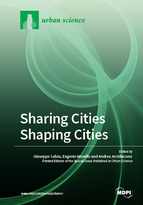Sharing Cities Shaping Cities
A special issue of Urban Science (ISSN 2413-8851).
Deadline for manuscript submissions: closed (5 October 2018) | Viewed by 55563
Special Issue Editors
Interests: design theory and methods; sustainable consumption and production; social practice theory; socio-technical transformations; sharing economy; collaborative consumption; DIY; repair
Special Issues, Collections and Topics in MDPI journals
Interests: urban sustainability; climate planning; urban planning and design; co-creation; urban greening
Special Issues, Collections and Topics in MDPI journals
Interests: urban planning and design; urban projects assessment; landscape planning; open spaces planning and design; green infrastructures design, ecosystem services analysis and policies for ‘Land take’ limitation
Special Issue Information
Dear Colleagues,
The sharing economy and collaborative consumption are attracting a great deal of interest due to their business, legal and civic implications. The consequences of the spreading of sharing-based practices in urban environments and under daily dynamics are underexplored.
This Special Issue aims to address if and how sharing shapes cities, the way that spaces are designed and lived in if social interactions are escalated, and the ways that habits and routines take place in post-individualistic society.
In particular, the following key questions are of primary interest:
- Urban fabric: How is ‘sharing’ shaping cities? Does it represent a paradigm shift with tangible and physical reverberations on urban form? How are shared mobility, work, inhabiting, energy, and food provisions reconfiguring the urban and social fabric?
- Social practices: Are new lifestyles and practices related to sharing changing the use and design of spaces? To what extent is sharing triggering a production and consumption paradigm shift to be reflected in urban arrangements and infrastructures?
- Sustainability: Does sharing increase the intensity of use of space and assets, or, rather, does it increase them to meet the expectations of convenience for urban lifestyles? To what extent are these phenomena fostering more economically-, socially-, and environmentally-sustainable practices and cities?
- Policy: How can policy makers and municipalities interact with these bottom-up and phenomena and grassroots innovation to create more sustainable cities?
We invite contributions to respond to the above questions from the fields of urban studies, urban planning and design, service design, sociology, geography, anthropology, innovation studies, and related, theoretically-grounded and informed by the results of fieldwork activities.
Dr. Giuseppe Salvia
Prof. Eugenio Morello
Prof. Andrea Arcidiacono
Guest Editors
Manuscript Submission Information
Manuscripts should be submitted online at www.mdpi.com by registering and logging in to this website. Once you are registered, click here to go to the submission form. Manuscripts can be submitted until the deadline. All papers will be peer-reviewed. Accepted papers will be published continuously in the journal (as soon as accepted) and will be listed together on the special issue website. Research articles, review articles as well as short communications are invited. For planned papers, a title and short abstract (about 100 words) can be sent to the Editorial Office for announcement on this website.
Submitted manuscripts should not have been published previously, nor be under consideration for publication elsewhere (except conference proceedings papers). All manuscripts are thoroughly refereed through a double-blind peer-review process. A guide for authors and other relevant information for submission of manuscripts is available on the Instructions for Authors page. Urban Science is an international peer-reviewed open access quarterly journal published by MDPI.
Please visit the Instructions for Authors page before submitting a manuscript. The Article Processing Charge (APC) is waived for well-prepared manuscripts submitted to this issue. Submitted papers should be well formatted and use good English. Authors may use MDPI's English editing service prior to publication or during author revisions.
Keywords
- sharing economy
- urban studies
- collaborative consumption
- P2P and commons
- smart cities
- urban fabric
- sustainable consumption
- policy innovation
- social innovation
- spatial planning








